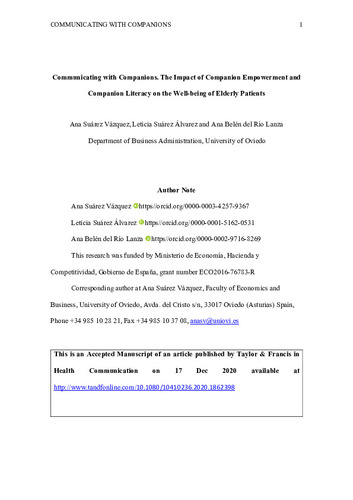Communicating with Companions. The Impact of Companion Empowerment and Companion Literacy on the Well-being of Elderly Patients
Autor(es) y otros:
Palabra(s) clave:
health literacy, health empowerment, companions, elderly patients, well-being
Fecha de publicación:
Editorial:
Taylor & Francis
Versión del editor:
Citación:
Resumen:
The complexity of the current healthcare ecosystem justifies the convenience of targeting patients’ companions in health communication strategies. Designing successful interventions requires taking into account which keys should be pressed in companions in order to generate positive outcomes in the accompanied patients. In particular, this paper explores how companion health empowerment and companion health literacy affect the well-being of chronically-ill elderly patients. Data for this research come from a cross-sectional quantitative study including 1,814 individuals (907 chronically-ill elderly patients and their 907 companions). Data were collected through two online questionnaires, one for patients and one for companions. The findings suggest that companion health empowerment is defined by the dimensions information search empowerment and knowledge development and decision participation empowerment. Furthermore, the distinction between functional, interactive and critical health literacy has revealed to be useful for comprehending companion health literacy. A structural equation model shows that critical health literacy sets the threshold above which companion health literacy improves accompanied patient wellbeing, even more so when it is backed up by companion information search empowerment and by companion knowledge development and decision participation empowerment.
The complexity of the current healthcare ecosystem justifies the convenience of targeting patients’ companions in health communication strategies. Designing successful interventions requires taking into account which keys should be pressed in companions in order to generate positive outcomes in the accompanied patients. In particular, this paper explores how companion health empowerment and companion health literacy affect the well-being of chronically-ill elderly patients. Data for this research come from a cross-sectional quantitative study including 1,814 individuals (907 chronically-ill elderly patients and their 907 companions). Data were collected through two online questionnaires, one for patients and one for companions. The findings suggest that companion health empowerment is defined by the dimensions information search empowerment and knowledge development and decision participation empowerment. Furthermore, the distinction between functional, interactive and critical health literacy has revealed to be useful for comprehending companion health literacy. A structural equation model shows that critical health literacy sets the threshold above which companion health literacy improves accompanied patient wellbeing, even more so when it is backed up by companion information search empowerment and by companion knowledge development and decision participation empowerment.
ISSN:
Patrocinado por:
Ministerio de Economía, Hacienda y Competitividad, Gobierno de España, grant number ECO2016-76783-R.
Colecciones
- Administración de Empresas [514]
- Artículos [37549]
Ficheros en el ítem





